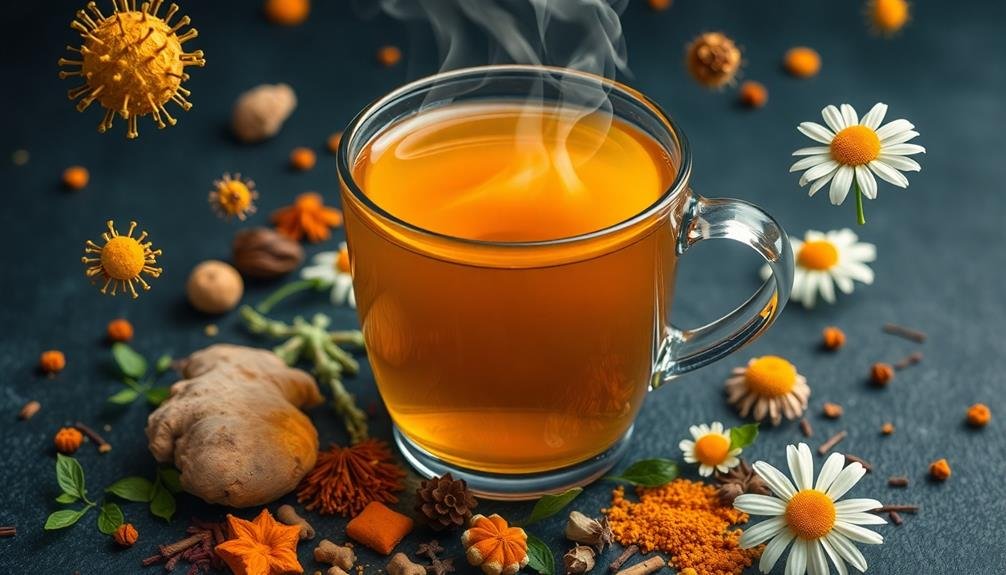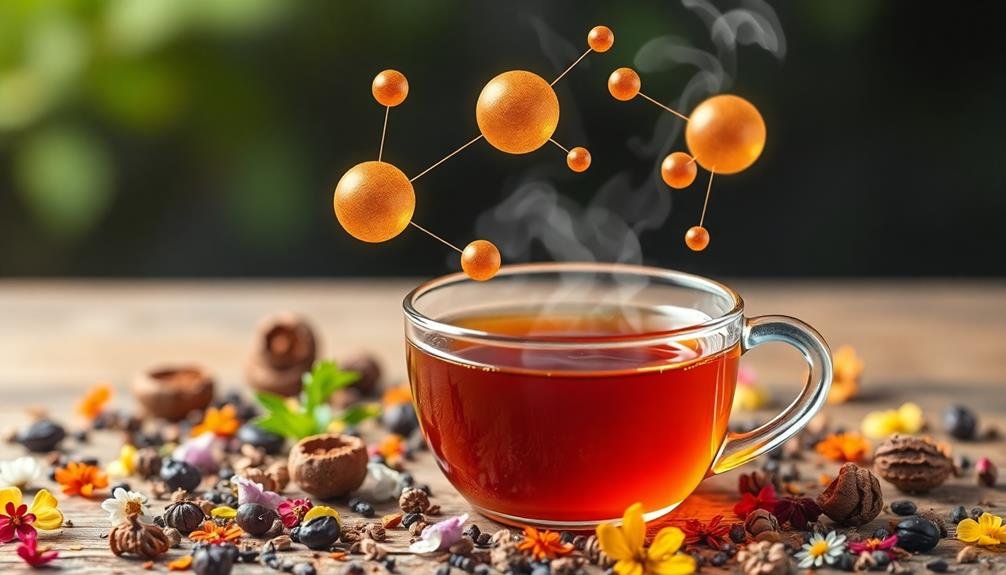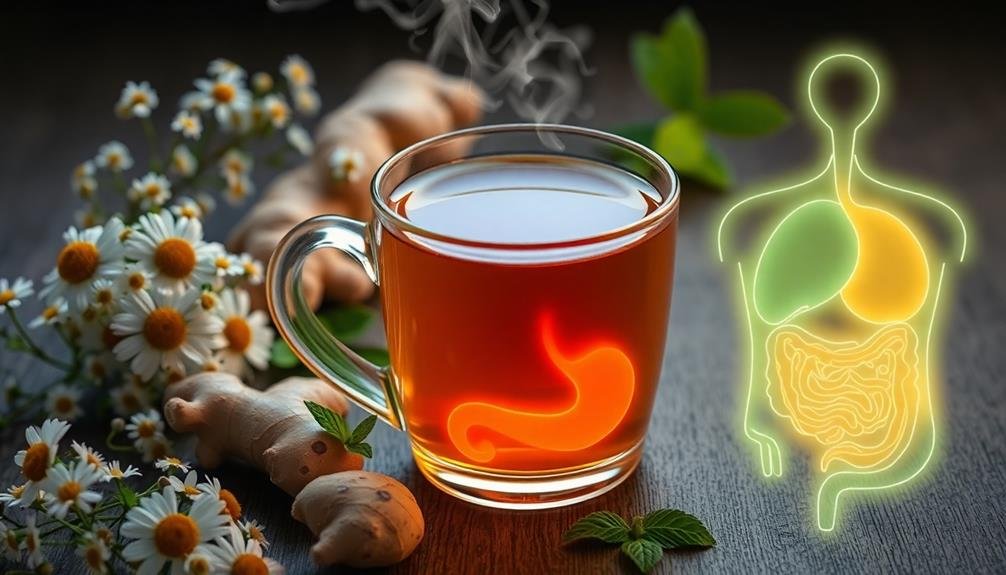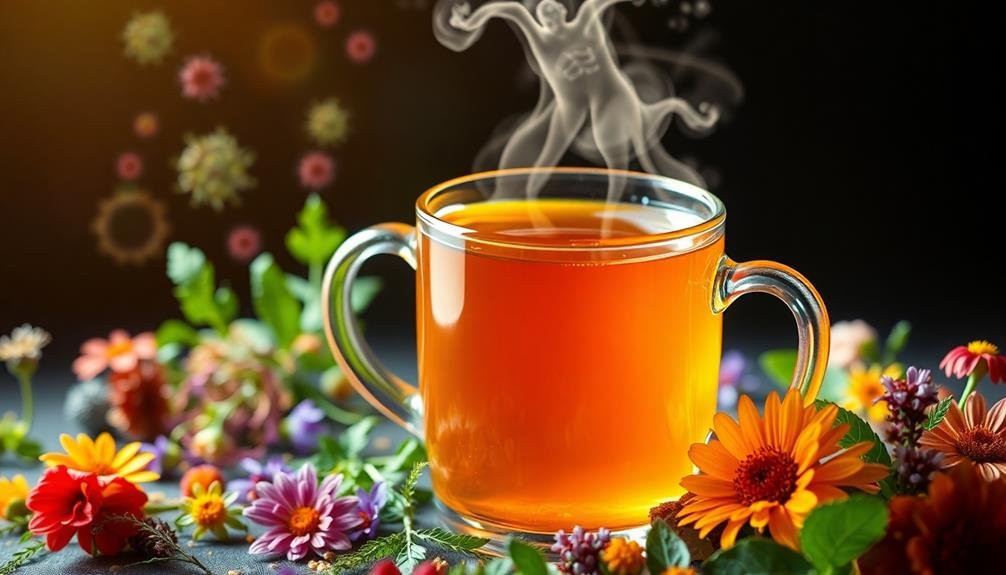Herbal teas boost immunity and reduce inflammation through their rich blend of antioxidants, vitamins, and minerals. They stimulate white blood cell production and enhance immune cell activity, helping your body fight off infections. Key herbs like turmeric, ginger, and green tea contain potent anti-inflammatory compounds that can lower chronic inflammation associated with various diseases. These teas also combat oxidative stress, alleviate digestive discomfort, and reduce stress levels, all of which contribute to a stronger immune system. By incorporating herbal teas into your daily routine, you'll tap into nature's pharmacy and access a world of health benefits.
Herbal Tea's Immune-Boosting Properties

Antioxidants, vitamins, and minerals in herbal teas can greatly boost your immune system. These powerful compounds work together to strengthen your body's defense mechanisms, helping you fight off infections and diseases more effectively.
Many herbal teas contain high levels of vitamin C, which stimulates the production of white blood cells, your body's first line of defense against pathogens. Echinacea tea, for example, is known to increase the number and activity of immune cells, enhancing your overall immunity.
Ginger tea offers potent anti-inflammatory properties, reducing inflammation throughout your body and supporting immune function. It's also rich in antioxidants that protect your cells from damage caused by free radicals.
Green tea is packed with catechins, powerful antioxidants that have been shown to boost T-cell production and enhance their function. These cells play an essential role in your immune response.
Elderberry tea contains compounds that can help reduce the severity and duration of colds and flu by inhibiting the replication of viruses. It also supports overall immune health by providing essential nutrients.
Key Anti-Inflammatory Herbs
Nature's pharmacy offers a wealth of anti-inflammatory herbs that can be brewed into potent teas. Turmeric stands out as a powerhouse, containing curcumin, which reduces inflammation throughout your body.
Ginger, another potent herb, helps alleviate joint pain and muscle soreness while supporting digestive health. You'll find that green tea, rich in catechins, not only fights inflammation but also boosts your metabolism.
Don't overlook the benefits of chamomile, which soothes your digestive system and promotes relaxation. Peppermint tea can ease headaches and muscle tension, while also supporting respiratory health.
If you're looking to combat chronic inflammation, consider brewing a cup of rosehip tea, packed with vitamin C and antioxidants. Licorice root tea offers natural cortisol-like effects, helping to reduce inflammation in your body.
For those dealing with arthritis or joint pain, try brewing a tea with boswellia or devil's claw. These herbs have been shown to reduce inflammation and provide relief.
Antioxidants in Herbal Teas

Immerse yourself in the world of herbal teas, and you'll discover a treasure trove of antioxidants waiting to boost your health. These powerful compounds protect your cells from oxidative stress and free radical damage, which can lead to chronic diseases and premature aging.
Green tea, for instance, is rich in catechins, particularly epigallocatechin gallate (EGCG), a potent antioxidant that's been linked to cancer prevention and improved heart health.
Rooibos tea, with its unique flavonoids like aspalathin and nothofagin, offers strong antioxidant and anti-inflammatory benefits.
You'll find quercetin, a flavonoid with antihistamine properties, in chamomile tea. This antioxidant can help reduce allergy symptoms and support overall immune function.
Hibiscus tea boasts anthocyanins and vitamin C, which may lower blood pressure and boost your immune system.
Don't overlook the antioxidant power of peppermint tea, which contains rosmarinic acid and flavonoids that can help combat oxidative stress.
Stress Reduction and Immunity
While antioxidants play a key role in boosting immunity, the stress-reducing properties of herbal teas shouldn't be overlooked. Chronic stress weakens your immune system, making you more susceptible to illness. Herbal teas can help combat this by promoting relaxation and reducing stress levels.
Many herbal teas contain compounds that interact with your body's stress response systems. For example, chamomile tea has been shown to decrease cortisol levels, the primary stress hormone. Similarly, lavender tea can help reduce anxiety and improve sleep quality, both of which are essential for maintaining a strong immune system.
When you incorporate stress-reducing herbal teas into your daily routine, you're giving your immune system a boost. Here are three ways these teas can help:
- Lowering cortisol levels, which can suppress immune function when chronically elevated
- Improving sleep quality, allowing your body to repair and regenerate more effectively
- Reducing anxiety and promoting relaxation, which supports overall immune health
Digestive Health Connection

You'll find that certain herbal teas can soothe digestive discomfort, offering relief from issues like bloating and indigestion.
These teas also play a vital role in supporting your gut microbiome, which is essential for overall immune function.
Soothing Digestive Discomfort
Have you ever experienced digestive discomfort after a meal? Herbal teas can provide soothing relief for various digestive issues, making them an excellent natural remedy. These teas work by calming inflammation in the gut, reducing bloating, and easing cramping.
Peppermint tea is particularly effective for soothing an upset stomach and relieving indigestion. Its natural menthol content helps relax the muscles of your gastrointestinal tract, allowing gas to pass more easily and reducing bloating.
Ginger tea is another powerful ally in combating nausea and promoting healthy digestion. It stimulates the production of digestive juices and enzymes, aiding in the breakdown of food.
To maximize the benefits of herbal teas for digestive health:
- Drink a cup of chamomile tea before bed to reduce nighttime acid reflux
- Sip on fennel tea after meals to prevent bloating and gas
- Try a blend of peppermint and licorice root tea to soothe stomach ulcers
Gut Microbiome Support
Beyond soothing digestive discomfort, herbal teas play an essential role in supporting your gut microbiome. These teas contain polyphenols and other bioactive compounds that act as prebiotics, nourishing beneficial gut bacteria. When you consume herbal teas regularly, you're fostering a diverse and balanced gut ecosystem.
Certain herbal teas, like peppermint and ginger, have antimicrobial properties that can help keep harmful bacteria in check while promoting the growth of beneficial microbes.
Chamomile tea has been shown to increase the abundance of Bifidobacterium and Lactobacillus species, both vital for gut health.
Green tea, rich in catechins, can enhance the growth of Akkermansia muciniphila, a bacterium associated with improved metabolic health.
Oolong and black teas also contribute to a healthier gut microbiome by increasing short-chain fatty acid production, which supports gut barrier function.
Preparation Methods for Maximum Benefits
Proper preparation methods are essential for extracting the maximum benefits from herbal teas. To guarantee you're getting the most out of your herbal infusions, pay attention to water temperature, steeping time, and the quality of your herbs.
Different herbs require specific temperatures to release their beneficial compounds without destroying them. For example, delicate herbs like chamomile thrive in water just below boiling, while hardier roots like ginger can withstand boiling water.
Steeping time varies depending on the herb and desired strength. Over-steeping can lead to bitter flavors and potentially reduced benefits. Generally, leaves and flowers steep for 5-10 minutes, while roots and barks may need 10-20 minutes.
Always use fresh, high-quality herbs or trusted organic brands for the best results.
To maximize the immune-boosting potential of your herbal teas:
- Use a covered container to prevent volatile oils from escaping
- Experiment with cold infusions for heat-sensitive herbs
- Combine complementary herbs to create synergistic blends
Frequently Asked Questions
Can Pregnant Women Safely Consume Herbal Teas for Immunity?
You should be cautious with herbal teas during pregnancy. While some are safe, others can be harmful. Always consult your healthcare provider before consuming any herbal teas to verify they're safe for you and your baby.
How Long Does It Take to Notice the Benefits of Drinking Herbal Teas?
You'll typically notice the benefits of drinking herbal teas within a few weeks of regular consumption. However, some effects may be felt immediately, like relaxation or improved digestion. Consistency is key to experiencing long-term health benefits.
Are There Any Potential Side Effects of Consuming Herbal Teas Regularly?
While generally safe, regular consumption of herbal teas can have side effects. You might experience allergic reactions, interactions with medications, or digestive issues. Some teas can cause caffeine sensitivity or affect sleep patterns. Always consult a doctor if concerned.
Can Children Drink Herbal Teas for Immunity and Inflammation Reduction?
You should be cautious about giving herbal teas to children. While some may be safe, others can cause side effects. It's best to consult your pediatrician before introducing any herbal teas to your child's diet.
Do Herbal Teas Interact With Prescription Medications or Supplements?
Yes, herbal teas can interact with medications and supplements. You should always consult your doctor before combining them. Some teas may enhance or interfere with drug absorption, alter effectiveness, or cause adverse reactions. It's essential to be cautious.
In Summary
You've discovered the power of herbal teas for your immune system and overall health. By incorporating these natural brews into your daily routine, you're giving your body a boost of antioxidants, anti-inflammatory compounds, and stress-reducing properties. Don't forget to experiment with different herbs and preparation methods to find what works best for you. Remember, a healthy gut leads to a stronger immune system, so sip on these teas regularly for maximum benefits.





Leave a Reply